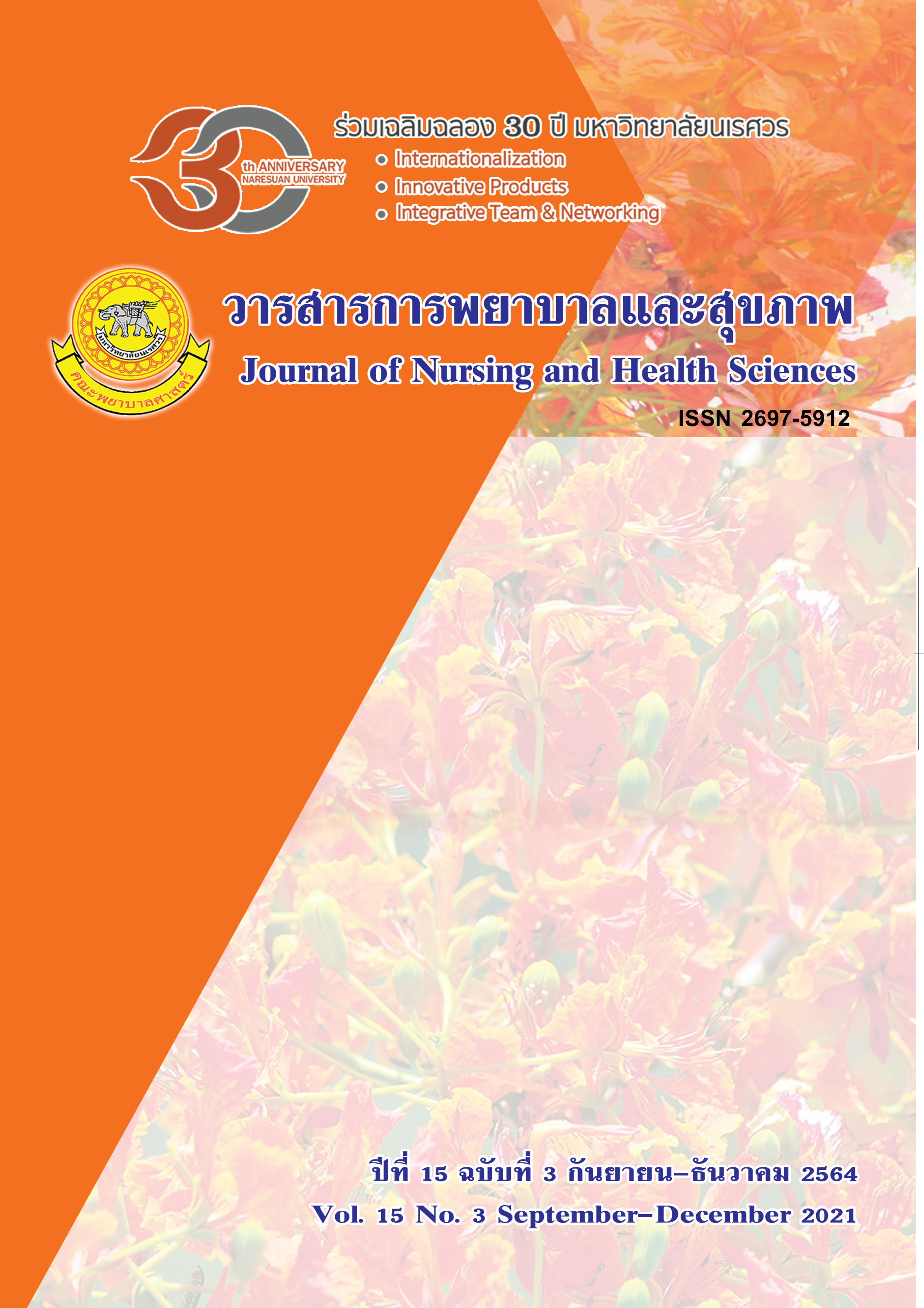การประยุกต์ใช้ทฤษฏีการส่งเสริมการรับรู้สมรรถนะตนเองในการปฏิบัติการพยาบาล: กรณีศึกษาการหย่าเครื่องช่วยหายใจของผู้ป่วยผ่าตัด
Main Article Content
บทคัดย่อ
การผ่าตัดเป็นวิธีการรักษาโรคและค้นหาสาเหตุ การผ่าตัดบางชนิดจำเป็นต้องใช้เครื่องช่วยหายใจระหว่างการผ่าตัด เนื่องจากผลของการใช้ยาระงับความรู้สึกขณะผ่าตัดมีผลต่อการทำงานของกล้ามเนื้อระบบทางเดินหายใจ ซึ่งผู้ป่วยจะได้รับการใส่ท่อช่วยหายใจและใช้เครื่องช่วยหายใจ จนกระทั่งการผ่าตัดเสร็จสิ้น ถ้าผู้ป่วยสามารถหายใจได้ด้วยตนเองจึงจะเริ่มหย่าเครื่องช่วยหายใจและเอาท่อช่วยหายใจออก ซึ่งกิจกรรมดังกล่าวล้วนส่งผลต่อผู้ป่วยทั้งด้านร่างกายและจิตใจ ดังนั้นการดูแลผู้ป่วยหลังผ่าตัดควรเริ่มกระบวนการหย่าเครื่องช่วยหายใจเพื่อถอดท่อช่วยหายใจออกโดยเร็วที่สุด
บทความวิชาการนี้มีวัตถุประสงค์เพื่ออธิบายการประยุกต์ใช้ทฤษฎีการรับรู้สมรรถนะตนเอง ซึ่งเป็นการส่งเสริมความมั่นใจของผู้ป่วยว่าจะสามารถหย่าเครื่องช่วยหายใจได้ เมื่อมีพฤติกรรมปฏิบัติตามขั้นตอนในการหย่าเครื่องช่วยหายใจ
Article Details

อนุญาตภายใต้เงื่อนไข Creative Commons Attribution-NonCommercial-NoDerivatives 4.0 International License.
เอกสารอ้างอิง
Bandura, A. (1997). Self-efficacy. In V. S. Ramachaudran,
(Ed.), Encyclopedia of human behavior.
New York: Academic Press.
Bhurayanontachai, R., & Chanbrahama, C. (2016).
Comparative study of the success rate of
mechanical ventilator liberation between
applying and not applying rapid shallow breathing
index (RSBI) in patients with acute respiratory
failure after passing clinical readiness assessment.
Songklanagarind Medical Journal, 34(4), 153-161.
[In Thai].
Bunburapong, T. (2018). Respiratory care in clinical
practice (8th ed.). Bangkok:Phanyamit printing
company limited. [In Thai].
Chaiweeradet, M., Ua-Kit, N., & Oumtanee, A. (2013).
Experiences of beingan adult patient receiving
mechanical ventilator. Songklanagarind Journal
of Nursing, 33(3),31-46. [In Thai].
Kusum, V., & Hengyodmak, A. (2017). Air way and
ventilatory management. In V. Kusum, (Ed),
Critical care nursing: A holistic approach
(6th ed.) (pp.116-153). Bangkok: Sahaprachapanich.
[In Thai].
Nuanjan, A., Thongthawee, B., Matchim, Y., &
Saiphoklang, N. (2021). The effect of perceived
self - efficacy in respiratory muscle training with
modified Qigong program on duration of weaning
from mechanical ventilator in patients with
respiratory failure. Thai Journal of Cardio-Thoracic Nursing, 32(1), 152-165. [In Thai].
Patchanasuntorn, B. (2017). Complications of mechanical
ventilator. In S. Rungruanghiranya, (Ed.),
Mechanical ventilation: The essentials (2nd ed.)
(pp. 429-438). Bangkok: Beyond enterprise
company limited. [In Thai].
Pathomjaruwat, T., Wattanakitkrileart, D., Pinyopasakul,
W., & Wongsurakiat, P. (2013). Correlation
between awareness of self-performance of
disorder severity and of anxiety and duration of
spontaneous breathing trial in patients not having
been weaned off respiratory. Thai Journal of
Nursing Council, 28(1), 49-63. [In Thai].
Pilab, S., Binhosen, V., & Pakdevong, N. (2019).
Effectiveness of an enhancing self-efficacy in
phase I cardiac rehabilitation program on
physical fitness among older persons post open
heart surgery. Journal of Nursing and Health
Care, 37(3), 12-24. [In Thai].
Piriyapatsom, A. (2017). Extubation. In S. Rungruanghiranya,
(Ed.), Mechanical ventilation: The essentials
(2nd ed.) (pp. 421-425). Bangkok: Beyond
enterprise company limited. [In Thai].
Tanakitapiwut, M. (2018). Principles of mechenical
ventilator. In S. Prichayudh, P. Chatrkaw, & S.
Poonyathawon, (Eds.), Chula surgical critical
care (pp.79-95). Bangkok: Chulalongkorn
University. [In Thai].
Wattanakitkrileart, D., Pathomjaruvat, T., & Kedcham,
D. (2013). Factors predicting weaning success
in patients with respiratory failure receiving
invasive mechanical ventilator. Journal of Nursing
Science, 31(3), 57-66. [In Thai].


